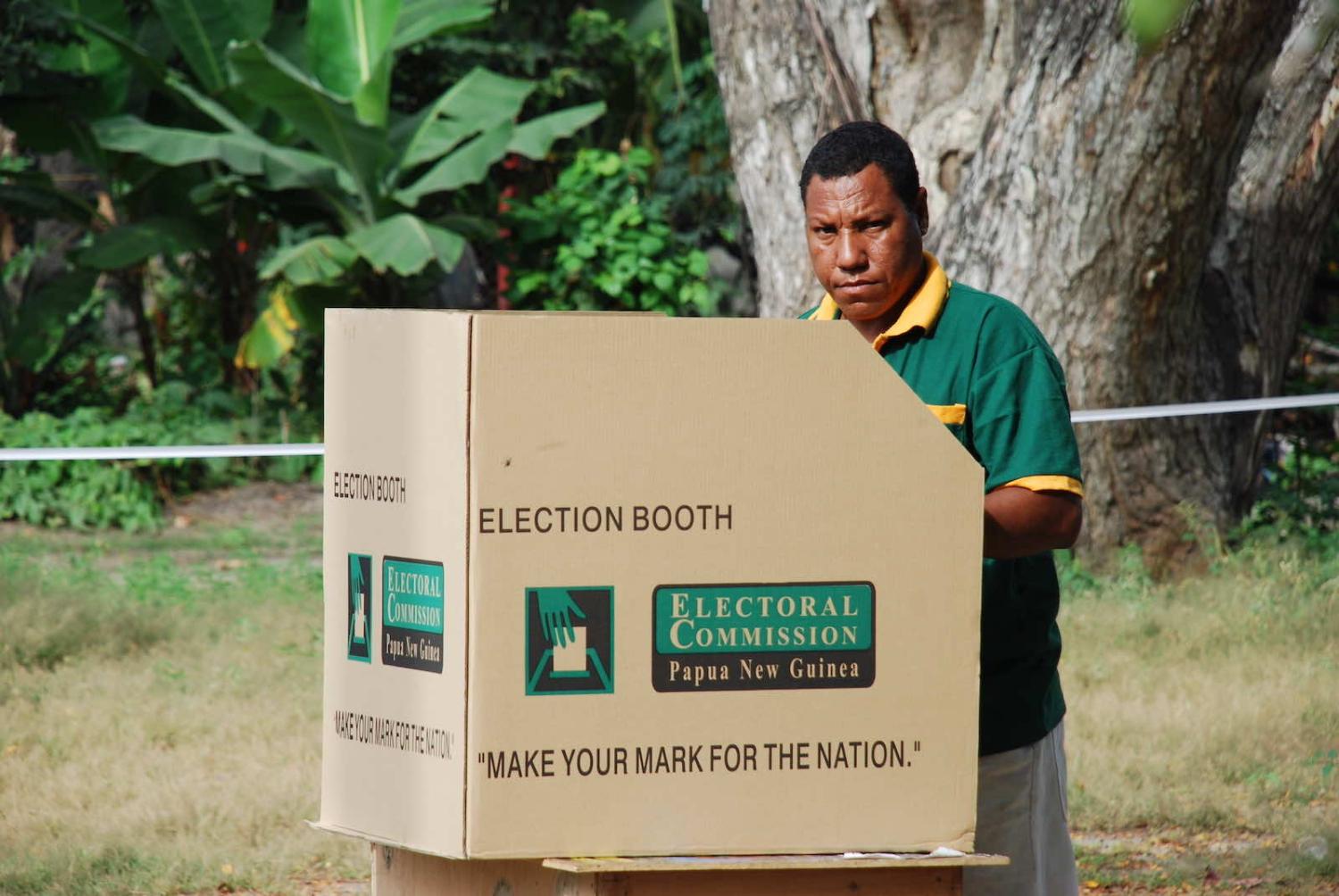In June, five million voters will go to the polls in Papua New Guinea’s elections. Despite many challenges facing the nation – spanning the economy to the environment – none of these are likely to feature in people’s minds as they cast their ballot.
Local first
Parochial issues tend to dominate in the voting booth. Few voters support a party because of that party’s policies or its ideology. Other factors exercise greater influence in PNG – one being that a voter will be more likely to back a candidate who is related to them. Voters may also follow a recommendation of an influential community figure. And they will usually vote for a candidate who has brought some tangible development to the community.
A recent study revealed PNG to be one of the most “clientelist” countries in the world, a term political scientists use to mean that voters value local, personal benefits more than they do national issues or policies. This is not surprising given 40 per cent of Papua New Guineans, prior to the pandemic, had incomes below the national poverty line. The GDP per capita outside the resources sector has also remained stagnant for the past seven years.
Whatever issues occupy people’s minds at the polls, the results will most certainly feature a high MP turnover rate.
The 2002 election was an exception to this norm of local concerns determining people’s votes. Widespread protests over proposed land reforms and the sale of PNG’s then state bank PNGBC provided an intense backdrop to the 2002 poll, with three university students killed in fatal shooting during the unrest. The election was also held after what had been three years of severe economic difficulty: the country had suffered from low and negative GDP growth, the exchange rate depreciating by more than 40 per cent, with inflation surging and private sector formal employment falling.
Pandemic shadows
Yet the conduct of the 2002 elections was also a standout as the worst in PNG’s short political history. Electoral fraud was widespread, and violence resulted in at least 100 deaths. The heavily contested reforms and economic difficulty almost certainly led to the turbulent political atmosphere, evidenced by fraudulently high voter turnout, and the large number of parties (44) that contested.
In a disturbing parallel to the 2002 experience, the recent loss of income during the pandemic and associated lockdowns, widespread protests against the vaccine-for-jobs mandate, as well as growing rates of inflation, may feature in this year’s elections. In addition, at least 10,000 jobs were lost during the pandemic, with formal employment still to recover.

Whatever issues occupy people’s minds at the polls, the results will most certainly feature a high MP turnover rate. In PNG’s nine elections, the MP turnover rate has averaged 54.8 per cent, and in 2017 it was 51 per cent. A former governor general once remarked that the elections were akin to the rebirth of PNG as a nation.
In past elections, only four of nine incumbent governments have returned successfully. Governments are formed in parliament – the party with the highest numbers following elections is invited to form government.
Shoring up support
The government of Prime Minister James Marape, with its strong Pangu Party or Papua and Niugini Union Pati (PANGU) base, has already begun to shore up its popularity ahead of the elections. Marape is doing this by this year reinstating free education and trying to stave off controversies by planning to reopen the Porgera mine in April as well as ensuring LNG landowners will receive outstanding equity payments.
The government has also withdrawn its support for a bill to reserve five seats for women in the parliament (there are no female MPs currently) and will no longer back amendments to the Organic Law on the Integrity of Political Parties and Candidates (OLIPPAC), which would require small parties to join large parties and have a party quota for women.
The government has also moved this month to create seven additional open electorates.

Continuity or change
At this point, the two likely candidates to become prime minister following the election are the incumbent Marape and former PM Peter O’Neill.
If Marape is successfully returned, he will likely continue his “take back PNG” ideology of seeking greater equity stakes in resource projects. Marape’s re-election would likely strengthen his hand in ongoing negotiations in projects such as the P’nyang gas field and Papua LNG (operated by the French company, Total).
Positive economic reforms undertaken in the past two years should also continue. These include the restructuring of state-owned enterprises, helmed by the Asian Development Bank, fiscal reforms to lower the wage bill and loan interest costs, and the second phase of reforms to the Bank of Papua New Guinea to ensure monetary policy is more growth focused. Negotiations for an independent Bougainville would also be expected to continue in their current form.
O’Neill becoming PM will likely shift the government to a more populist policy approach. His previous governments adopted a protectionist trade stance, instituting a wide number of tariff line increases, and held the exchange rate to a much more tightly managed regime that has since proved costly for business. He might also pursue a more nationalist stance in relation to investment outside the resource sector, given a proposal that his administration would require citizens to hold 50 per cent ownership stake of any investment under K10 million.
Of the two candidates, Marape seems more likely of the two to emerge successful given his control of government finances. Regardless of who forms the new government in August, they will have to grapple with two immediate problems: first, it must work to increase Covid-19 vaccination rates, which currently sit at six per cent of the population; second, it must grow the non-resource economy, which has been stagnant since 2014.

